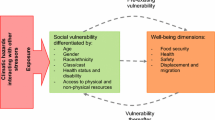Abstract
For environmental problems such as climate change, uncertainty about future conditions makes it difficult to know what the goal of mitigation efforts should be, and inequality among the affected parties makes it hard for them to know how much they each should do toward reaching the goal. We examine the effects of scientific uncertainty and wealth inequality in experiments where subjects decide how much to contribute toward reducing a common threat. We also explore how the framing of uncertainty affects collective action. Our results suggest that uncertainty lowers contributions, but contributions remain surprisingly high even in treatments with a variable loss probability, where such behavior is individually suboptimal (and where the underlying game is a prisoner’s dilemma). Further, we find that the characterization of uncertainty is crucial and that inequality need not lower contributions at all.


Similar content being viewed by others
References
Barrett S (2013) Climate treaties and approaching catastrophes. J Environ Econ Manag 66:235–250
Barrett S, Dannenberg A (2012) Climate negotiations under scientific uncertainty. Proc Natl Acad Sci U S A 109:17372–17376
Barrett S, Dannenberg A (2014) Sensitivity of collective action to uncertainty about climate tipping points. Nat Clim Change 4:36–39
Burton-Chellew MN, May RM, West SA (2013) Combined inequality in wealth and risk leads to disaster in the climate change game. Clim Change 120:815–830
Chan KS, Mestelman S, Moir R, Muller RA (1996) The voluntary provision of public goods under varying income distributions. Can J Economics 29:54–69
Chan K, Mestelman S, Moir R, Muller RA (1999) Heterogeneity and the voluntary provision of public goods. Exp Econ 2:5–30
Cherry TL, Kroll S, Shogren JF (2005) The impact of endowment heterogeneity and origin on public good contributions: evidence from the lab. J Econ Behav Organ 57:357–365
Croson R, Marks M (2001) The effect of recommended contributions in the voluntary provision of public goods. Econ Inq 39:238–249
Dannenberg A, Löschel A, Paolacci G, Reif C, Tavoni A (2015) On the provision of public goods with probabilistic and ambiguous thresholds. Environ Resour Econ 61:365–383
Fischbacher U (2007) z-Tree: Zurich toolbox for ready-made economic experiments. Exp Econ 10:171–178
IPCC (2013) Summary for policymakers. In: Stocker TF Q, Plattner D, Tignor G-K, Allen M, Boschung SK, Nauels J, Xia A, Bex Y, Midgley V, Midgley PM (eds) Climate change 2013: The physical science basis. Contribution of Working Group I to the fifth assessment report of the Intergovernmental Panel on Climate Change. Cambridge University Press, Cambridge, p 1535
Locke EA, Latham GP (2002) Building a practically useful theory of goal setting and task motivation. Am Psychol 57:705–717
Milinski M, Sommerfeld RD, Krambeck H-J, Reed FA, Marotzke J (2008) The collective-risk social dilemma and the prevention of simulated dangerous climate change. Proc Natl Acad Sci U S A 105:2291–2294
Milinski M, Röhl T, Marotzke J (2011) Cooperative interaction of rich and poor can be catalyzed by intermediate climate targets. Clim Change 109:807–814
Rapoport A (1988) Provision of step-level public goods: effects of inequality in resources. J Pers Soc Psychol 54:432–440
Rapoport A, Suleiman R (1993) Incremental contribution in step-level public goods games with asymmetric players. Organ Behav Hum Decis Process 55:171–194
Rapoport A, Bornstein G, Erev I (1989) Intergroup competition for public goods: effects of unequal resources and relative group size. J Pers Soc Psychol 56:748–756
Reuben E, Riedl A (2013) Enforcement of contribution norms in public goods games with heterogeneous populations. Game Econ Behav 77:122–137
Shackley S, Wynne B (1996) Representing uncertainty in global climate change science and policy: boundary-ordering devices and authority. Sci Technol Hum Val 21:275–302
Tavoni A, Dannenberg A, Kallis G, Löschel A (2011) Inequality, communication, and the avoidance of disastrous climate change in a public goods game. Proc Natl Acad Sci U S A 108:11825–11829
van Dijk F, Sonnemans J, van Winden F (2002) Social ties in a public good experiment. J Public Econ 85:275–299
Acknowledgements
We thank Paul Bell, Gretchen Nurse Rainbolt, Christopher Goemans, Nicholas Janusch, Alexander Maas, and seminar participants at the CU Environmental and Resource Economics Workshop, Beaver Creek, CO; Workshop on Behavioral and Experimental Economics, Florence, Italy; International Symposium on Society and Resource Management, Estes Park, CO; and Potsdam Institute for Climate Impact Research, Potsdam, Germany.
Author contributions
TCB and SK shared equally in all aspects of the research and writing.
Author information
Authors and Affiliations
Corresponding author
Ethics declarations
Conflict of interest
The authors declare that they have no conflict of interest
Electronic supplementary material
Below is the link to the electronic supplementary material.
ESM 1
(DOCX 143 kb)
Rights and permissions
About this article
Cite this article
Brown, T.C., Kroll, S. Avoiding an uncertain catastrophe: climate change mitigation under risk and wealth heterogeneity. Climatic Change 141, 155–166 (2017). https://doi.org/10.1007/s10584-016-1889-5
Received:
Accepted:
Published:
Issue Date:
DOI: https://doi.org/10.1007/s10584-016-1889-5



